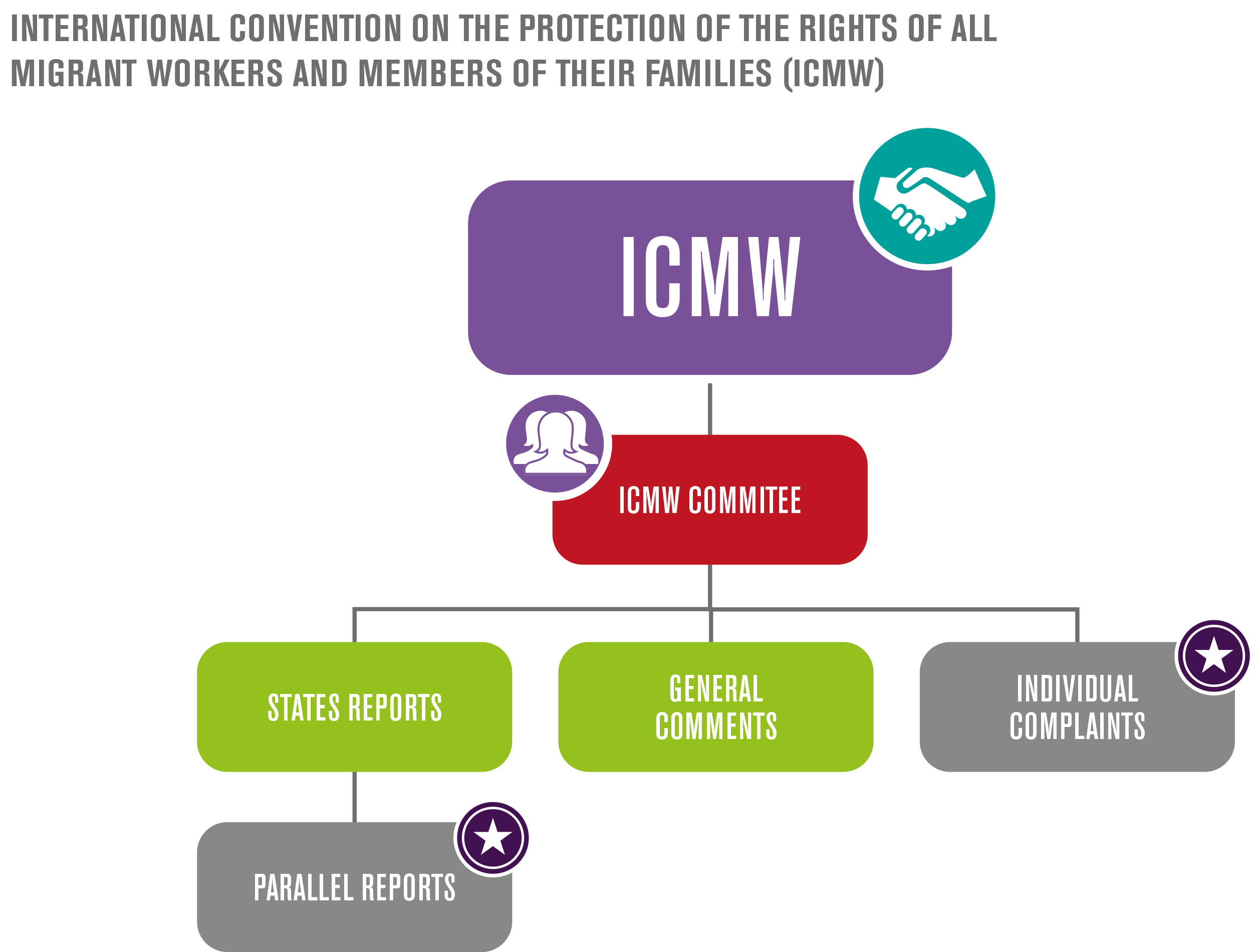



ICMW | ICMW Committee | States Reports | Parallel Reports | General Comments | Individual Complaints
At a glance
Entered into force: 1 July 2003
Optional Protocol(s): None
Treaty Body: Committee on the Protection of the Rights of All Migrant Workers and Members of Their Families (CMW)
Location: New York
Meetings: Annual
Reports to: General Assembly
States must report: Within one year of ratification, and every 5 years. Committee may request more frequent reports if they have specific concerns.
Has your State ratified it? ICMW
 International Convention on the Protection of the Rights of All Migrant Workers and Members of Their Families
International Convention on the Protection of the Rights of All Migrant Workers and Members of Their Families
Entered into force: 1 July 2003
The International Convention on the Protection of the Rights of All Migrant Workers and Members of Their Families (ICMW) was adopted by the United Nations General Assembly (Resolution 2016) on 18 December 1990. It is an international treaty dedicated international protection of the rights of all migrant workers and members of their families, reaffirming and establishing basic norms in a comprehensive convention which could be applied universally.
Women migrant workers predominate a number of job sectors, many of which lack formal economic protections. Due to the invisible and unregulated nature of these jobs women are at an increased risk of experiencing violence. According to the Committee on the Elimination of All Forms of Violence against Women, General Recommendation No. 26, 5 December 2008:
Women migrant workers are more vulnerable to sexual abuse, sexual harassment and physical violence, especially in sectors where women predominate. Domestic workers are particularly vulnerable to physical and sexual assault, food and sleep deprivation and cruelty by their employers. Sexual harassment of women migrant workers in other work environments, such as on farms or in the industrial sector, is a problem worldwide. Women migrant workers who migrate as spouses of male migrant workers or along with family members face an added risk of domestic violence from their spouses or relatives if they come from a culture that values the submissive role of the women in the family.
The unique vulnerabilities women migrant workers’ face are a concern of the Committee on the Protection of the Rights of All Migrant Workers and Members of Their Family and States are required to combat these vulnerabilities under the ICMW.
 Committee on the Protection of the Rights of All Migrant Workers and Members of Their Families (CMW)
Committee on the Protection of the Rights of All Migrant Workers and Members of Their Families (CMW)
The Committee on the Protection of the Rights of All Migrant Workers and Members of their Families (CMW) is the independent expert body appointed to oversee States parties’ implementation of the ICERD. It consists of 14 independent experts who are nationals of States parties to CMW. They are elected by secret ballot and serve four-year terms. CMW meets annually.
General Comments
In its General Comments, the Committee has addressed gender-based violence in relation to specific provisions in the ICMW and state responsibility to eliminate it.
60. As noted by the Committee on the Elimination of All Forms of Discrimination against Women, the position of female migrants is different from that of male migrants with regard to, inter alia, the migration channels used, the sectors of the labour market where they are employed, the forms of abuse they suffer and the consequences and impact thereof. Recognizing that most domestic workers are women and girls and taking into consideration traditional roles, the gendered labour market, the universal prevalence of gender-based violence and the worldwide feminization of poverty and labour migration, States should incorporate a gender perspective in efforts to understand their specific problems and develop remedies to the gender-based discrimination that they face throughout the migration process.
21. Migrant workers in an irregular situation, particularly women, are at increased risk of ill-treatment and other forms of violence at the hands of both private actors, including employers, and State officials which includes sexual violence, beatings, threats, psychological abuse, and denial of access to medical care, for example. Under article 16, paragraph 2, States parties have an obligation to protect all migrant workers and members of their families against violence, physical injury, threats and intimidation, whether by public officials or by private individuals, groups or institutions. This obligation requires States parties to:
- Adopt and implement legislation prohibiting such acts;
- Effectively investigate cases of abuse and violence;
- Prosecute and punish those responsible with appropriate punishments;
- Provide adequate reparation to victims and members of their families;
- Provide human rights training for public officials; and
- Effectively monitor the conduct of State agents, and regulate that of private persons and entities, with a view to preventing such acts
![]() Interested in other general comments? Browse all of the CMW’s general comments on the OHCHR website
Interested in other general comments? Browse all of the CMW’s general comments on the OHCHR website
States Reports
According to the CMW General Reporting Guideline:
In this part of the periodic report, the State party should provide updated information related to the current reporting period in accordance with the following categories; if there is nothing new to report under a category, it should be so stated:
…
* Legislation and practice providing for mechanisms to monitor the situation of migrant women, including those employed as domestic workers, and safeguards and guarantees to protect them from exploitation and violence;
* Procedures assisting victims of trafficking, especially women and children…
![]() Want more? Read the full text of the reporting guidelines on the OHCHR website
Want more? Read the full text of the reporting guidelines on the OHCHR website
![]() Parallel Reports
Parallel Reports
While state reports tend to provide information on legislative framework, they may not always thoroughly reflect the reality on the ground: for example, they may focus on domestic law, even though the implementation of that law for rights-holders may not be effective in practice. The Committee invites input from civil society to be used in their review of states’ reports (see section immediately above).This gives civil society actors the opportunity to present alternative evidence, views, findings and/or raise issues that are not covered by the state report. This input is submitted in the form of a report and parallel to the state report concerned. These reports are often referred to as “shadow reports” or “parallel reports”.
Interested in submitting a parallel report to the Committee?
![]() Individual Complaints
Individual Complaints
Individual complaints concerning VAW are often submitted to the Committee on the Elimination of all forms of Discrimination against Women, however cases involving multiple levels of discrimination can be submitted to other treaty bodies.
Interested in submitting an individual complaint to the Committee in the future?
Expected complaint procedure
For more information on engaging with the UN treaty bodies, see ‘Working with the United Nations Programme: A Handbook for Civil Society’

